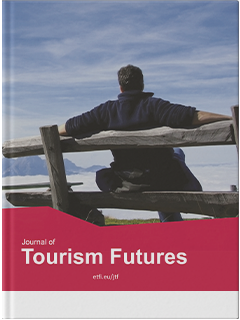Recognising the regenerative impacts of Canadian women tourism social entrepreneurs through a feminist ethic of care lens
IF 5.8
Q1 HOSPITALITY, LEISURE, SPORT & TOURISM
引用次数: 3
Abstract
PurposeThe overarching aim of this project is to understand the role women tourism social entrepreneurs (TSEs) play in contributing to regenerative practices in Canada.Design/methodology/approach Semi-structured interviews were carried out with women food TSEs with snowball sampling. This paper challenges the assumption that the masculine experience is the human experience. Accordingly, this research is informed by a feminist ethic of care lens to recognise the important role of Canadian women TSEs. Methodologically, the authors employed the strategies of a constructivist grounded theory to guide the analysis (Charmaz, 2011). This process involved carefully engaging in a close line by line reading of the transcripts, developing codes based on the authors’ dealings with the data including summarising, synthesising and sorting the data (Charmaz, 2011).FindingsThe analysis revealed three categories: (1) Adopting a regenerative mindset and enhancing well-being, (2) Supporting the consumption of real food and (3) Educating communities for regenerative and just futures. The analysis revealed the importance of women TSEs in adopting a regenerative and caring mindset to enhance the well-being of their communities and beyond.Research limitations/implicationsThe study focusses on the learnings from 11 entrepreneurs from Canada. There is a scope to expand the discussion with more interviews. The impact of this pandemic on the small businesses resulted in affecting the researchers’ participation by presenting some unique challenges in participant recruitment. Maybe the studies in the near future will focus on grounding the research papers based on other sexual orientations and indigenous social entrepreneurs.Practical implicationsThe authors hope future studies centre diversity and attend to the role of women in their communities to better under the diverse contributions. The work presented here is part of a broader study on the role and impact of women TSEs and so only reveals the tip of the Canadian iceberg. Forthcoming studies will attend to some of the gender-specific barriers faced by women TSEs and the supports required particularly in the wake of COVID-19. The authors hope other scholars continue to build on this work, adopting feminist approaches to enhance our understanding of the role women play in contributing to just, caring and regenerative futures.Social implicationsContributing to Higgins-Desbiolles and Monga's (2021) in-depth case study using an ethic of care to examine an Australian events business supporting homeless individuals, the analysis of the 11 in-depth interviews with Canadian TSE provides evidence of alternative ways women are delivering social value. Using an ethic of care lens has elicited the impacts created by the informants and the ripple effects particularly in light of regenerative practices which are crucial in the tourism sector as borders and destinations reopen to tourism as noted by Ateljevic (2020).Originality/valueThere are few studies in the tourism social entrepreneurship literature that recognise the agency and centres the vocies of women. Kimbu and Ngoasong (2016) made a call for more research to understand how women engage in social entrepreneurial activities and benefit their local communities. There are limited analyses on regenerative tourism in practice in the scholarly literature. To respond to this gap the authors examine the regenerative practices of women TSEs in Canada.从女性主义关怀伦理的角度认识加拿大女性旅游社会企业家的再生影响
目的本项目的总体目标是了解女性旅游业社会企业家(tse)在促进加拿大再生实践方面发挥的作用。设计/方法/方法采用滚雪球抽样法对女性食品tse进行半结构化访谈。本文对男性经验就是人类经验的假设提出了挑战。因此,这项研究是由一个女权主义伦理的护理镜头认识到加拿大妇女tse的重要作用。在方法上,作者采用了建构主义扎根理论的策略来指导分析(Charmaz, 2011)。这个过程包括仔细地一行一行地阅读成绩单,根据作者对数据的处理,包括总结、综合和整理数据,开发代码(Charmaz, 2011)。分析结果显示了三个类别:(1)采用可再生思维并提高幸福感;(2)支持真正的食物消费;(3)教育社区实现可再生和公正的未来。分析揭示了妇女tse在采用再生和关怀的心态以提高其社区和其他方面的福祉方面的重要性。研究局限/启示本研究集中于11位加拿大企业家的经验教训。通过更多的采访可以扩大讨论的范围。这次大流行对小企业的影响影响了研究人员的参与,在参与者招募方面提出了一些独特的挑战。也许在不久的将来,研究的重点将放在基于其他性取向和本土社会企业家的研究论文的基础上。实际意义:作者希望未来的研究能以多样性为中心,关注女性在社区中的作用,更好地在不同的贡献下发挥作用。这里介绍的工作是关于女性tse的作用和影响的更广泛研究的一部分,因此只揭示了加拿大的冰山一角。即将开展的研究将关注女性tse面临的一些性别障碍以及特别是在COVID-19之后所需的支持。作者希望其他学者继续在这项工作的基础上,采用女权主义的方法,加强我们对女性在促进公正、关怀和再生未来方面所起作用的理解。社会影响Higgins-Desbiolles和Monga(2021)的深入案例研究使用关怀伦理来研究澳大利亚支持无家可归者的活动业务,对加拿大TSE的11次深度访谈的分析提供了女性传递社会价值的其他方式的证据。正如Ateljevic(2020)所指出的那样,使用关怀伦理的视角引发了举报人所产生的影响和连锁反应,特别是考虑到再生实践,这在旅游业中至关重要,因为边界和目的地重新向旅游业开放。原创性/价值在旅游业社会创业文献中,很少有研究承认女性的代理和中心声音。Kimbu和Ngoasong(2016)呼吁进行更多研究,以了解女性如何参与社会创业活动并使当地社区受益。学术文献对再生旅游的实践分析有限。为了回应这一差距,作者研究了加拿大妇女tse的再生实践。
本文章由计算机程序翻译,如有差异,请以英文原文为准。
求助全文
约1分钟内获得全文
求助全文
来源期刊

Journal of Tourism Futures
HOSPITALITY, LEISURE, SPORT & TOURISM-
CiteScore
15.70
自引率
6.00%
发文量
64
审稿时长
34 weeks
期刊介绍:
 求助内容:
求助内容: 应助结果提醒方式:
应助结果提醒方式:


